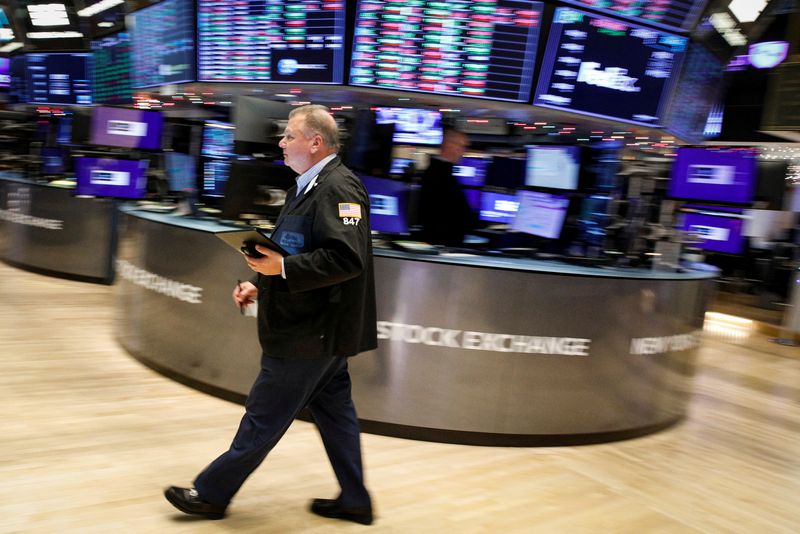By Lewis Krauskopf, Shreyashi Sanyal and Anisha Sircar
(Reuters) - Wall Street's main indexes dropped more than 1% on Monday as investors worried about the Omicron COVID-19 variant potentially undercutting the economic rebound and a critical setback to President Joe Biden's social-spending bill.
The financials and materials sectors fell most among S&P 500 sectors, while declines in mega-cap tech and tech-related stocks also dragged.
Coronavirus cases surged in New York City and around the United States over the weekend, dashing hopes for a more normal holiday season. Britain's leader said he would take more steps to slow the spread of Omicron if needed, after the Netherlands began a fourth lockdown and as other European nations considered restrictions.
"I think (the stock market) is down over COVID fears and how those fears may extend the continuing supply-chain problems and how that will impact profits ... for companies,” Chuck Carlson, chief executive officer at Horizon Investment Services in Hammond, Indiana.
The Dow Jones Industrial Average fell 433.28 points, or 1.23%, to 34,932.16, the S&P 500 lost 52.62 points, or 1.14%, to 4,568.02 and the Nasdaq Composite dropped 188.74 points, or 1.24%, to 14,980.94.
Financials fell 1.9% and materials dropped 1.8%. Microsoft (NASDAQ:MSFT) and Tesla (NASDAQ:TSLA) were the biggest individual weights on the S&P 500, falling 1.2% and 3.5% respectively.
The indexes finished above their session lows, but the benchmark S&P 500 ended below its 50-day moving average, a key technical level.
In a further knock to market sentiment, U.S. Senator Joe Manchin said on Sunday he would not support Biden's $1.75 trillion domestic investment bill Build Back Better, dealing it a potentially fatal blow.
After Manchin's comments, Goldman Sachs (NYSE:GS) trimmed its quarterly U.S. GDP forecasts for 2022.
The developments came as the Federal Reserve decided last week to end its pandemic-era stimulus faster, with the central bank signaling at least three quarter-percentage-point interest rate hikes by the end of 2022.
Investors have taken a more defensive stance this month, with sectors such as consumer staples and utilities rising most. Those two groups ended Monday's session with slim gains, the only sectors in positive territory.
The S&P 500 remains up 21.6% so far in 2021.
“Given the strength of the market so far this year, in some ways you could see investors take some profits and look for greater clarity in the new year,” said Michael Arone, chief investment strategist at State Street (NYSE:STT) Global Advisors.
In company news, Oracle Corp (NYSE:ORCL) shares fell 5.2% after the business software maker said it would buy electronic medical records company Cerner Corp (NASDAQ:CERN) for $28.3 billion.
Declining issues outnumbered advancing ones on the NYSE by a 4.38-to-1 ratio; on Nasdaq, a 2.70-to-1 ratio favored decliners.

The S&P 500 posted two new 52-week highs and 11 new lows; the Nasdaq Composite recorded 13 new highs and 346 new lows.
About 11.4 billion shares changed hands in U.S. exchanges, below the 12 billion daily average over the last 20 sessions.